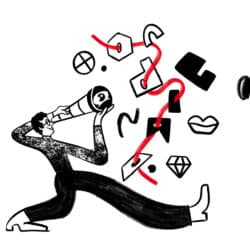In this reflection on Cannexus, the national career-development conference, Ashleigh-Rae Thomas wonders how she and another participant could have such contrasting reactions to discussions of diversity in the workplace. Black, Indigenous, and racialized people all know well the importance of DEI efforts. But what about decision-makers and people in positions of power who feel nonchalant toward, or even attacked by, equity initiatives in the workplace?
Earlier this year, I attended a national career-development conference, Cannexus, for the very first time. There was a huge focus on diversity in the workplace.
Throughout the sessions I sat in the first morning, speakers presented ideas about what the future of work in Canada could be, noting that workers are more queer, more diverse, and getting older. At one session about Indigenous workers, I learned about the “hands back, hands forward” model, which embodies the concept of receiving past teachings and passing these on to future generations in sustainable ways. Each session, including an inspiring keynote, underscored the importance of diversity in the workplace and seemed to pose this question: how can we keep up with an increasingly diverse workforce across the country?
As a (young) Black woman, these ideas resonated with me. That others were talking about issues I have experienced left me feeling invigorated and optimistic.
My feeling of hopefulness didn’t last very long, though. At lunch, I sat beside an older white man who had also attended the inspiring (to me) keynote. He complained to a woman beside him that he was no longer attending sessions about race or mental health. “It’s all the same thing over and over,” he said. “My white guilt is at an all-time high. Everything is the ‘white man’s’ fault.”
It occurred to me that, while the conference was about inclusivity and diversity, there are some who feel left out of these conversations.
I was floored. How did we sit in on the same keynote and leave with completely opposite impressions? As far as I had seen that morning, no one was blaming white people in particular for anything, although there were definitely discussions about racism, prejudice, white supremacy, and how oppressive systems affect everyone.
It occurred to me that, while the conference was about inclusivity and diversity, there are some who feel left out of these conversations. Black, Indigenous, and racialized people all know very well the importance of diversity efforts. But what about decision-makers and people in positions of power who feel nonchalant toward, or even attacked by, equity initiatives in the workplace?
I spoke to Lakeisha Mathews, who holds a doctorate in education and is the director of the Career and Internship Center at the University of Baltimore and president of the National Career Development Association. Mathews’s work includes matching employers with diverse candidates. Her presentation touched on barriers that keep employees of colour out of various workplaces and how to tackle unconscious bias.
For people who just may have never been exposed to DEI, education is key. In the research around unconscious bias, it does say forcing people to participate in this kind of training doesn’t work.
Lakeisha Mathews, US National Career Development Association
I asked Mathews what she thought of two participants leaving a keynote with such conflicting feelings. Mathews thinks it’s a good thing when a session leaves people feeling emotional. It means it’s done something to you and heightened your awareness. “For people who just may have never been exposed to DEI [diversity, equity, and inclusion], education is key. In the research around unconscious bias, it does say forcing people to participate in this kind of training doesn’t work,” Mathews explained.
She said that while some people had a racial reckoning in 2020, there are others who have pushed back against anti-racism efforts. “After George Floyd, you hear a lot of talk about anti-racism and adding it to the curriculum. But you have states like Florida that are fighting it tooth and nail to not have books about racism or any books about any underrepresented groups. They don’t want anyone to tell them how to feel about their privilege and their inequity.”
When it comes to having a conversation with people like the man I sat beside, Mathews says that taking an empathetic approach can be key. “I will empathize because it can be overwhelming. The second piece, I might just flip it and say, ‘What’s making you feel that way? What did you get out of it?’”
She pointed out that diversity issues can be very hard to understand for people of privilege.
Maybe the answer is we need to help those who are privileged process the emotion of it, the way we help the BIPOC population process the emotional trauma and microaggressions.
Lakeisha Mathews
So, what can be done if someone feels more offended than inspired by a session or forums addressing DEI issues? Mathews provided more food for thought: she explained that a white person might grapple with what to do with the trauma of the history. Apologize? Blame self? Be offended? She pointed out that the “offended” white male delegate likely “didn’t know what to do with that, and maybe the answer is we need to help those who are privileged process the emotion of it, the way we help the BIPOC population process the emotional trauma and microaggressions.”
Mathews thinks that people who feel hostile about … affirmative action and DEI probably haven’t had a chance to sort through their feelings about it. So they leave sessions on the topic feeling targeted and blamed.
Mathews thinks that people who feel hostile about things like affirmative action and DEI probably haven’t had a chance to sort through their feelings about it. So they leave sessions on the topic feeling targeted and blamed. She reminded me of a truth I sometimes forget in my impatience for change: “We have to remember everybody’s at different places with their multicultural competency.”
So as I reflect on her words and couch them in the reality of my lived experience, I realize that, as much as I believe in, affirm, support, and agitate for DEI initiatives to better the lives of Black, Indigenous, and racialized people in the workforce, I must remember that everyone is at a different place – those with privilege and those wanting more.
But these initiatives are the way forward for Canada and the world. It’s the right thing to do. It must be done. And yes, it will sometimes offend.


